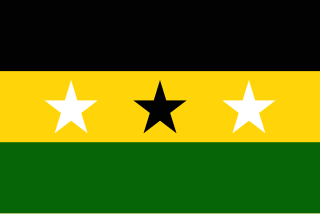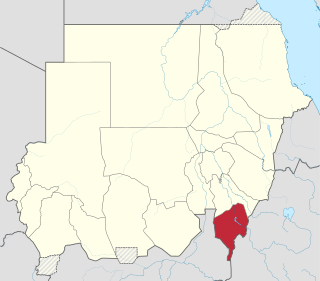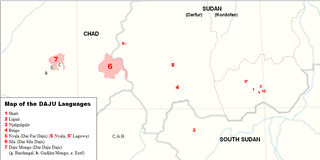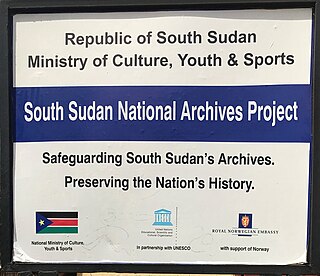Related Research Articles

The demographics of Sudan include the Sudanese people and their characteristics, Sudan, including population density, ethnicity, education level, health, economic status, religious affiliations, and other aspects of the population.

The Kakwa people are a Nilotic ethnic group and part of the Karo people found in north-western Uganda, south-western South Sudan, and north-eastern Democratic Republic of the Congo, particularly to the west of the White Nile river.

The Masalit are an ethnic group inhabiting western Sudan and eastern Chad. They speak the Masalit language.

Blue Nile State is one of the eighteen states of the Republic of the Sudan. It was established by presidential decree nº 3 in 1992 and it is named after the Blue Nile River.

The Daju languages are spoken in isolated pockets by the Daju people across a wide area of Sudan and Chad. In Sudan, they are spoken in parts of the regions of Kordofan and Darfur, in Chad they are spoken in Wadai. The Daju languages belong to the Eastern Sudanic subfamily of Nilo-Saharan.

The Anyuak, also known as Anyuaa and Anywaa, are a Luo Nilotic ethnic group inhabiting parts of East Africa. The Anuak belong to the larger Luo family group. Their language is referred to as Dha-Anywaa. They primarily reside in the Gambela Region of western Ethiopia, and South Sudan. Group members number between 200,000 and 300,000 people worldwide. Many of the Anyuak people now follow Christianity. It is one of the first of the Nilotic groups to become almost entirely Christian, following the Shilluk people.

The Avukaya are an ethnic group of South Sudan. Some members of this ethnic have fled to the Democratic Republic of the Congo due to persecution. About 50,000 members of this ethnic group live in South Sudan. Many members of this ethnic group belong to the Christian minority of South Sudan. The Avukaya traditionally live in a rain-forest area in Equatoria close to the Democratic Republic of Congo in Southern Sudan.
The Logo people or Logoa (plural) are an ethnic group of Nilotic origin who live predominantly in the north-east of the Democratic Republic of the Congo as well as parts of western Uganda and southern South Sudan. There are believed to be more than 200,000 people who identify as ethnically Logo of whom most live in the Congo's Faradje Territory, a remote region in Haut-Uélé Province, where they form the ethnic majority. Logo people also live in Watsa and Aba, both also in Haut-Uélé, and in Yei in South Sudan.
The Otuho people, also known as the Lotuko, are a Nilotic ethnic group whose traditional home is the Eastern Equatoria state of South Sudan. They speak the Otuho language.
Tacho is an indigenous ethnic group of South Sudan based mainly around southern Kordofan and in the Moro Hills and in the areas surrounding the border between Sudan and South Sudan. They are also known by the names Tocho and Toicho; about 90% of the population practice Islam as their main religion.
The Daju people are a group of seven distinct ethnicities speaking related languages living on both sides of the Chad-Sudan border and in the Nuba Mountains. Separated by distance and speaking different languages, at present, they generally have little cultural affinity to each other.
The Gula language, or Tar Gula, of the Central African Republic, commonly known as Kara, is a Central Sudanic language or dialect cluster. The term "Kara" is also attached to numerous ethnic groups of the region and their languages, and so is often ambiguous.

South Sudan, officially the Republic of South Sudan, is a landlocked country in East Africa. It is bordered on the north by Sudan; on the east by Ethiopia; on the south by the Democratic Republic of the Congo, Uganda and Kenya; and on the west by the Central African Republic. South Sudan's diverse landscape includes vast plains and plateaus, dry and tropical savannahs, inland floodplains, and forested mountains. The Nile River system is the defining physical feature of the country, running south to north across its center, which is dominated by a large swamp known as the Sudd. South Sudan has a population of 12.7 million. Juba is the capital and largest city.

The culture of South Sudan encompasses the religions, languages, ethnic groups, foods, and other traditions of peoples of the modern state of South Sudan, as well as of the inhabitants of the historical regions of southern Sudan.

South Sudan is home to around 60 indigenous ethnic groups and 80 linguistic partitions among a 2021 population of around 11 million. Historically, most ethnic groups were lacking in formal Western political institutions, with land held by the community and elders acting as problem solvers and adjudicators. Today, most ethnic groups still embrace a cattle culture in which livestock is the main measure of wealth and used for bride wealth.

South Sudan is a multilingual country, with over 60 indigenous languages spoken. The official language of the country is English which was introduced in the region during the colonial era.
Baka is a Central Sudanic language of South Sudan, with the majority living in an area centered on Maridi, South Sudan, but also a couple thousand speakers in the DRC. It has consonants with trilled release such as and.
Nyolge or Nyagulgule (Njalgulgule) is a Daju language of the Western Daju, spoken in a single village in South Sudan.
The Luo are a Nilotic ethnic group that live in Western Bhar Gazal, South Sudan. They are part of a larger group of ethno-linguistically related Luo people of East Africa. They speak the Luo language
References
- ↑ Gurtong Peace Project
- 1 2 Ethnologue: "Njalgulgule - A language of Sudan" retrieved February 5, 2013